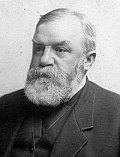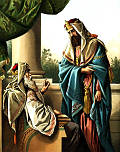| Criticism Spotlight |

 Moody, Sankey, and the Shut Door One critic wonders how Ellen White could teach the shut door, when so many were
being converted in the crusades of Moody and Sankey. We took a look at a few resources
on the lives of these great Christian evangelists, and were a bit amused at what we found. Moody, Sankey, and the Shut Door One critic wonders how Ellen White could teach the shut door, when so many were
being converted in the crusades of Moody and Sankey. We took a look at a few resources
on the lives of these great Christian evangelists, and were a bit amused at what we found. |
|

| Insightful Info |

 The Discipline of Suffering "Why am I suffering, Lord?" While Ellen White didn't say why
you specifically might be suffering, she did give a glimpse into how
God can use the sorrow and suffering in our lives to make us stronger Christians and
prepare us for greater responsibilities. The Discipline of Suffering "Why am I suffering, Lord?" While Ellen White didn't say why
you specifically might be suffering, she did give a glimpse into how
God can use the sorrow and suffering in our lives to make us stronger Christians and
prepare us for greater responsibilities. |
|

| Her Beliefs |

 Eschatology: The Millennium Ellen White's eschatology was most definitely pre-millennial. She believed in a
millennium composed of a literal 1000 years, immediately preceded by a literal second coming
of Christ. However, her view of what takes place during the millennium was somewhat
different from that of many evangelicals. See if you think her views were biblical or not. Eschatology: The Millennium Ellen White's eschatology was most definitely pre-millennial. She believed in a
millennium composed of a literal 1000 years, immediately preceded by a literal second coming
of Christ. However, her view of what takes place during the millennium was somewhat
different from that of many evangelicals. See if you think her views were biblical or not. |
|

|
| "There are conscientious souls that trust
partly to God and partly to themselves. They do not look to
God, to be kept by His power, but depend upon watchfulness
against temptation and the performance of certain duties for
acceptance with Him. There are no victories in this kind of
faith. Such persons toil to no purpose; their souls are in
continual bondage, and they find no rest until their burdens are
laid at the feet of Jesus." | | (Faith and Works 38) |
|
|
|
|  |


| Life Sketch Snippet |
| Two Dreams Soon after this I had another dream.
I seemed to be sitting in abject despair with my face in my hands
. . . . This dream gave me hope. The green cord
represented faith to my mind, and the beauty and simplicity of
trusting in God began to dawn upon my soul. [more] |
|

|


